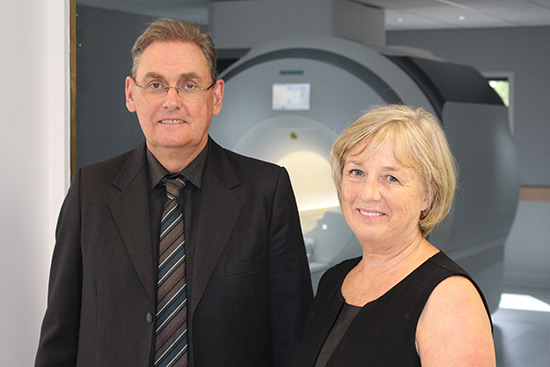Breast cancer early warning signal
A new magnetic resonance spectroscopy (MRS) technique developed by Australian researchers may potentially reduce or delay the need for preventive mastectomies among women at high risk of breast cancer.
 According to a study published on 3
March 2015 in the US journal Radiology*, the
non-invasive scanning technology detected a series of biochemical changes
in breast tissue which could provide early warning signs and improve
ongoing risk management for women with BRCA gene abnormalities.
According to a study published on 3
March 2015 in the US journal Radiology*, the
non-invasive scanning technology detected a series of biochemical changes
in breast tissue which could provide early warning signs and improve
ongoing risk management for women with BRCA gene abnormalities.
Mutations with BRCA1 and BRCA2 bring a 50 per cent risk of developing breast cancer before the age of 50, and many carriers currently opt to have mastectomies to avoid getting cancer later in life.
Using a technique known as localised correlated spectroscopy (L-COSY), researchers from the University of Newcastle and Brigham and Women's Hospital in Boston identified chemical disparities associated with the pre-invasive cancer state – a very early stage of disease development.
"These changes appear to represent a series of early warning signs that may allow women to make informed decisions as to when and if they have a prophylactic mastectomy," said lead author Professor Carolyn Mountford, CEO and Director of Research at the Translational Research Institute (TRI) in Queensland and conjoint professor with the University of Newcastle.
"It took a multidisciplinary team, including an MR physicist, chemists, surgeons and radiologists to be sure that what we were seeing wasn't apparent from conventional contrast-enhanced imaging."
The researchers performed L-COSY on 23 women carrying BRCA mutations and compared the results with those from 10 healthy controls who had no family history of breast cancer.
While no abnormality was recorded by standard contrast-enhanced MRI scans and ultrasound, L-COSY identified statistically significant biochemical changes in women with BRCA1 and BRCA2 gene mutations compared to the controls.
Study co-author Dr David Clark, from the Breast and Endocrine Centre in Gateshead (NSW), believes the protocol may help guide treatment decisions and bring added reassurance for BRCA-positive women.
"We think there are three stages of pre-cancer progression in the breast tissue," he said. "Women at Stage 1 could monitor their breasts with follow-up spectroscopy every six months.
"Approximately half the women who have BRCA mutations may not develop breast cancer at all, and certainly not before they turn 50, so we can advise a significant number of them that, yes, they may need a mastectomy one day … but not yet."
Dr Saadallah Ramadan, a physical chemist from the University of Newcastle and HMRI researcher, specifically programmed the MR scanners to suit the innovative L-COSY protocol as the software is not commercially available.
"It's the first time in the world it has been used for BRCA and the results were very assuring," Dr Ramadan said. "Our error margin was small enough to suggest the test can be repeatable on a larger scale."
The researchers now aim to expand the trial and will continue to monitor women in the original study group to learn more about the biochemical changes and what they represent.
Professor John Forbes from the ANZ Breast Cancer Trials Group believes the technology is extremely important.
"It may allow a more precise and earlier assessment of breast cancer risk for women known to have a BRCA1 or BRCA2 gene mutation," he said. "Currently these women have to consider early detection and risk management strategies without knowing whether they will actually get breast cancer or when it might occur."
Professor Mountford said the team also found evidence that pathways for lipid molecules are affected differently in the two different gene mutations, a possible explanation for why BRCA2 mutation carriers generally survive longer than BRCA1 carriers.
The study was conducted at the University of Newcastle's Centre for MR in Health, using a state-of-the-art Siemens Magnetom Prisma 3T scanner, and the Calvary Mater Newcastle in conjunction with the HMRI Cancer Research Program.
* Radiology is published by the Radiological Society of North America.
Contact
- Media and Public Relations.
- Phone: 02 4921 5577.
Related news
- Launch of the School Students’ Statement on the Right to a Healthy Environment
- Funding boost to technology for lower emission steel
- Newcastle team on mission to improve childhood cancer outcomes
- Shanae’s passion for caring delivers her dream to work in health
- Food and nutrition degree serves Keren a rewarding career
The University of Newcastle acknowledges the traditional custodians of the lands within our footprint areas: Awabakal, Darkinjung, Biripai, Worimi, Wonnarua, and Eora Nations. We also pay respect to the wisdom of our Elders past and present.